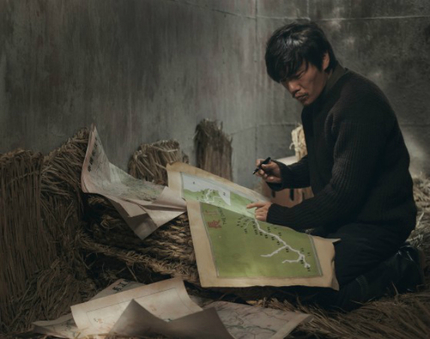Berlinale 2016 Review: CROSSCURRENT Channels The Poetry Of Confusion

Coincidentally starring Qin Hao who previously featured in Blind Massage, and also fronted by Xin Zhilei, this film sails along with a three-man barge crew as they transport a mysteriously illegal cargo upstream. Except the captain's journey becomes intertwined with the hauntingly beautiful figure of Xin Zhilei at they meet over and over at a variety of port towns which fringe the longest river in Asia. Their enigmatic relationship soon becomes the real crux of the narrative, and it drives the film into ever more mystical (or confusing) territory as it progresses.
Nevertheless, Crosscurrent does represent one of the most promising openings of Berlinale so far. The first thing we see is an epigraph that states, "Time, like a river, flows both day and night." So immediately the film then sets about trying to alter our sense of time, almost always lingering rather than cutting - even as characters move out of shot. Similarly the camera works deftly to convey the sense of the river's movement, sometimes bobbing jerkily in time with the waves. Though largely the camera seems to behave as though it we part of the boat, either tracking along the water from its perspective or remaining static as other ships sail against the grain of its vision.
Also captivating is the film's foley and cinematography techniques. The soundtrack is always flooded with the delicately accentuated sounds of the oceanic expanses we see, and rarely is any music from outside that world offered. Instead we get a feature-length symphony of wind, waves and choppy motors, and in terms of a acoustic experience it is quite mesmerising. The cinematography too inhabits this rather magical, moody realm of smog-like transience, as wispy clouds hug the river's endless horizon in almost every frame.
This strikingly consistent stream of haze then enables the film to make the step into Chinese mythology, theology and poetry as the film's opening line perhaps suggests - something also reinforced by a book of poems which the love-stricken captain mysteriously finds stashed aboard his ship. These curious poems turn out to correspond with the sleepy towns which flank the unrelenting river, and gradually they begin to act as a map for where the two lovers confused meetings occur next.
The inconsistent flow of time in this film is therefore broken up arbitrarily into days and is simultaneously punctuated by a series of pit stops where the surtitled lines of poetry tell us which town we have reached. The haiku-esque lines in these scenes often focus on concepts of purity and they really seem to have something of the loaded significance of Japanese death poetry, leading you to suspicions that one or both of these lovers actually might be dead, or even more so that they might somehow be falling for each other across multiple periods of time all stitched together by the timeless flow of the river.
For a culture so deeply embedded in a belief system born on the banks of the Ganges, you also can't help feel that this film's voyage is one profoundly filled with Buddhist significance. But enlightenment never seems in reach with this film, and at times it does feel like you'd have to have a PhD in Asiatic cultures to fully enjoy this film. Not being able to achieve a complete kind of understanding is part of the point of this film, though, and it would seem Yang Chao was very much involved in trying to explore the potential for film to behave like a poem.
In other words, meaning is never meant to quite be literal in Crosscurrent, and it is always more about the concepts it can seem to evoke through the metaphorical and unexpected collisions it creates. Though this directorial mission perhaps ultimately falls down at a hurdle of its own making. As the movie becomes increasingly mystical, it fails to have the same contracted effect that poetry can have, and above all it just seems to lose the hypnotic narrative propulsion that it first sets out with.
Overall, the ambiguousness of the movie's experience is certainly in-keeping with contemporary Chinese cinema. It's just that this film is perhaps rather like Hsiao-Hsien Hou's The Assassin: gorgeously artistic, but not quite all there in terms of narrative fire power.

Do you feel this content is inappropriate or infringes upon your rights? Click here to report it, or see our DMCA policy.






